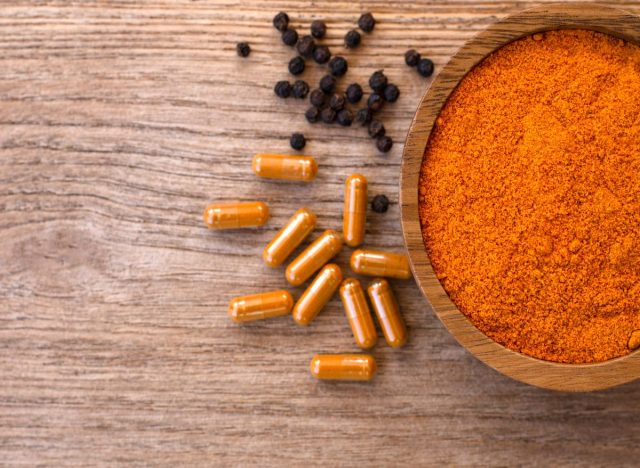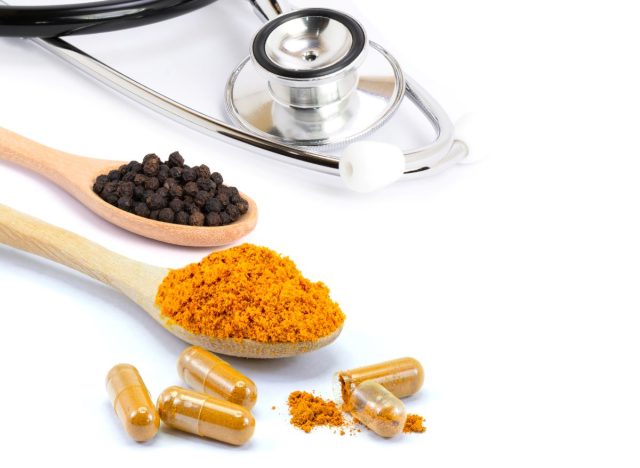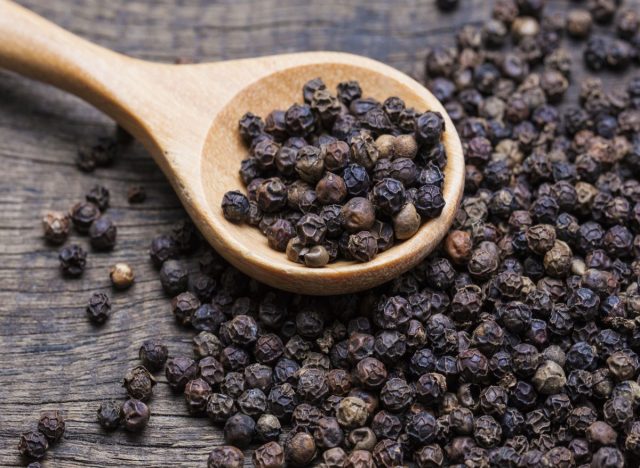A seasoning you put on nearly all your food, black pepper is a staple in the kitchen. This spice is perfect for amping up the flavor with just a little extra zest or bitterness. It makes for a great addition in recipes, and also has very few calories for one teaspoon serving.
Consuming black pepper does have positive impacts. However, it can come with some downsides if consumed too often. Our dietitians from our medical expert board help to rack up some helpful tips on the side effects of black pepper.
Helps with nutrient absorption.

"Black pepper can help better absorb nutrients such as beta-carotene and iron," says Brittany Dunn, MS, RDN, CD, and owner of Dunn Nutrition.
Dunn also states that black pepper is often used in addition to turmeric supplements to help better improve absorption for antioxidant and anti-inflammatory properties of both. Turmeric's main active ingredient, curcumin, gives the spice anti-inflammatory capabilities. However, it needs to be paired with black pepper in order to get the full effect.
In fact, a 2017 research review in the journal Foods, explained that the piperine, the active compound in black pepper, was associated with a 2,000% increase in the bioavailability of curcumin. This means that body's ability to absorb and gain the benefits of turmeric increases when black pepper is consumed with turmeric.
Dunn has also had the opportunity to make anti-inflammatory recovery shots for Olympic athletes. Since black pepper helps your body absorb curcumin she added it to the shot, along with mango, and pineapple for increased antioxidants and palatability.
It can help lower cholesterol.

"Although human studies are limited, black pepper may also help lower cholesterol and fight against certain cancers," says Lisa Moskovitz, RD, CEO of NY Nutrition Group and author of The Core 3 Healthy Eating Plan.
In a study reported by the Pharmaceutical Biology Journal, rats were fed a high-fat diet for 42 days. A black pepper extract had decreased blood cholesterol levels, including LDL (bad) cholesterol.
Furthermore, black pepper's piperine is believed to boost the absorption of dietary supplements that have potential cholesterol-lowering effects, such as turmeric.
They contain antioxidant effects.

"Black pepper is not just a tasty kitchen staple, but it also has antioxidant properties that can help protect against free radical damage and fight inflammation," says Moskovitz.
"Free radicals are molecules with unattached electrons in the body that can cause cellular damage," explains Dunn. "They can form in our bodies in response to pollution, poor diet, smoking, and more. "The antioxidants are chemicals that neutralize free radicals and reduce the risk of cellular damage."
However, Dunn states that more research is required since most tests are limited to animal subjects.
Your acid reflux could get worse.

"If you suffer from acid reflux or GERD, black pepper may not be your friend as it can cause rising acid in your esophagus," says Moskovitz.
Since black pepper is a spice, chances are some people may find there's a little kick to the taste. Spicy foods can trigger acid reflux, so it's important to consume black pepper in moderation. Or, if it's severe, cut it out altogether.
No comments:
Post a Comment